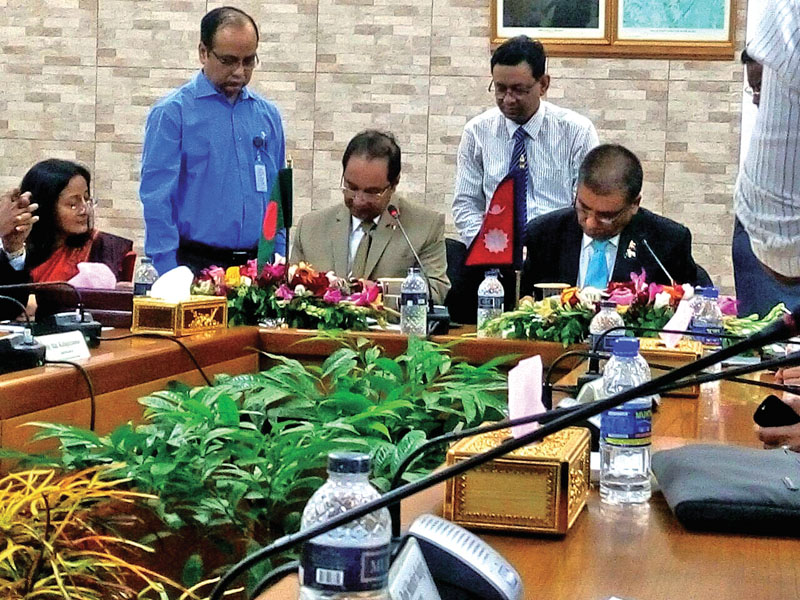Nepal, Bangladesh agree to remove TBT
Kathmandu, May 11
Nepal-Bangladesh commerce secretary-level talks concluded in Dhaka today with the signing of a memorandum of understanding (MoU) for removal of Technical Barriers to Trade (TBT) to expand trade volume between the two countries.
Now, both parties will observe quality certification procedures and lab operations in each other’s countries to address quality-related issues of the products being traded, according to Commerce Secretary Naindra Prasad Upadhyay.
Nepal Bureau of Standards and Metrology Director General Bishwo Babu Pudasaini and his Bangladeshi counterpart signed the MoU today in the presence of commerce secretaries of Nepal and Bangladesh.
Talking to The Himalayan Times over phone from Dhaka, Commerce Secretary Upadhyay said that the MoU has paved the way to sign mutual recognition agreement (MRA) for the recognition of the lab certification of each other’s countries to remove the quarantine-related hurdles in the coming days.
The commerce secretary-level talks held on Tuesday and today also reached agreements on raft of issues to address other non-tariff barriers and some critical trade facilitation measures. The delegation led by Upadhyay and his counterpart Hedayetullah Al Mamoon agreed to assign technical committee (led by joint-secretaries of commerce ministry) to develop implementation modality of preferential market access for some goods in each other’s countries.
Nepal and Bangladesh have already finalised the list of products that would be provided preferential market access in their respective countries. Nepal has agreed to provide preferential market access for 50 Bangladeshi goods, whereas Bangladesh has agreed to provide similar treatment for 108 Nepali goods. The list of goods for preferential market access has been already prepared and this will come into effect after signing letter of exchanges of implementation modality.
During the talks, both countries agreed to enhance the existing infrastructure to boost trade. Facility of the land customs offices will be enhanced under this agreement. Likewise, Bangladesh government will improve the condition of Jamuna Bridge, which links Mangla port of Bangladesh. As Indian government has agreed for seamless movement of vehicles in Phulbari-Banglabandha corridor, both countries have agreed to improve land customs facility eyeing expansion of trade volume in future.
Similarly, both countries agreed to bring Singhabad (India)-Rohanpur (Bangladesh) rail transit facility (provided by India) into operation. Besides Rohanpur-Singhabad transit, Nepal has urged Bangladesh to convert Radhikapur (India)-Birol (Bangladesh) rail line into broad gauge to bring the route into operation for trade between two countries. In response, Bangladesh has informed the works to convert broad gauge railway line has been expedited.
In addition to this, both countries agreed to simplify visa and immigration process for the tourists travelling to each other’s countries via land route to promote tourism. During the talks, both countries also agreed to participate in trade fairs of each other’s countries.
Kathmandu-Dhaka bus service had also been incorporated in the agenda of the talks. However, as it is already being discussed under BBIN (Bangladesh-Bhutan-India-Nepal) motor vehicle agreement, the commerce secretary level talks did not lay much emphasis on the issue.
Meanwhile, Upadhyay made courtesy call to the Commerce Minister of Bangladesh Tofail Ahmed and informed of developments made during commerce secretary-level talks.






